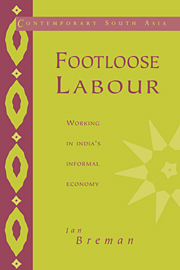Book contents
- Frontmatter
- Contents
- List of tables
- Map of south Gujarat identifying rural and urban fieldwork sites in Surat and Valsad districts
- 1 Introduction
- 2 Changing profile of rural labour
- 3 Inflow of labour into south Gujarat
- 4 Contact between demand and supply
- 5 Quality of the labour process
- 6 Mode of wage payment and secondary labour conditions
- 7 State care for unregulated labour
- 8 Proletarian life and social consciousness
- Bibliography
- Index
8 - Proletarian life and social consciousness
Published online by Cambridge University Press: 05 June 2012
- Frontmatter
- Contents
- List of tables
- Map of south Gujarat identifying rural and urban fieldwork sites in Surat and Valsad districts
- 1 Introduction
- 2 Changing profile of rural labour
- 3 Inflow of labour into south Gujarat
- 4 Contact between demand and supply
- 5 Quality of the labour process
- 6 Mode of wage payment and secondary labour conditions
- 7 State care for unregulated labour
- 8 Proletarian life and social consciousness
- Bibliography
- Index
Summary
Adrift?
For rural workers in the central plain of south Gujarat, the home village is no longer the only or even the most important arena of employment. The moral economy which formerly kept the landpoor and the landless proletariat tied to the village and, conversely, obliged the owners of land or of other means of existence to rely exclusively on labour from the village or, at least, to give priority to ‘our people’ whenever help had to be hired, is now only a memory. Even in the past tense, it is an idealized construction that is exaggerated, by both parties in opposite directions, in order to show up the contrast with the present situation more sharply. This does not alter the fact that mutual involvement which was so natural in the past has made way for an external orientation which has strengthened internal lines of division. In this respect I would note that the breaking-up of local patron–client relationships preceded the outflow/inflow of labour in the countryside and did not result from it. It is certainly a fact that, once this trend had started, the moral economy continued irreversibly and more quickly to decline under the influence of large-scale labour circulation. In the modern economy, wage hunters and gatherers circulate along a wide variety of workplaces in differing branches of industry, whether or not in agriculture, or in the home village.
- Type
- Chapter
- Information
- Footloose LabourWorking in India's Informal Economy, pp. 222 - 264Publisher: Cambridge University PressPrint publication year: 1996



